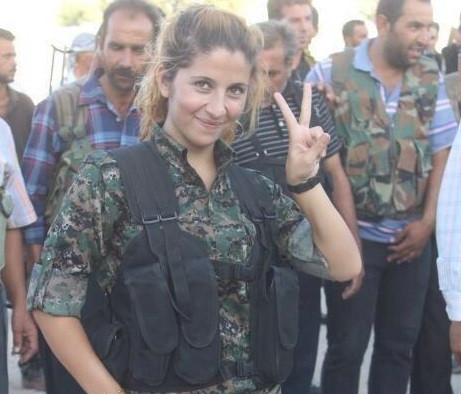Female Fighters Battling Isis in Kobani Turned into Sex Objects by Scared West

War has always been perceived as a masculine pastime. From the time of Troy, when Andromaque and Helen were fretting over their men on the battlefield, to the very recent conflicts in Afghanistan, Iraq, Libya and Syria, battlefields have always been full of bloodthirsty men while women were meant to stay at home, waiting impatiently for their husbands, sons or brothers.
Few political arenas, let alone military arenas, in modern history have been graced by women alongside men. French women left their kitchens in the days of the Paris Commune in 1871, calling for a Union des Femmes for the first time ever in the country.
The Kurdish women battling Isis have detonated the perception of Arabic women put forth by the Western media
In November 1936, women made barricades in Madrid to defend the city from the Fascists and later formed Mujeres Libres, an anarchist association that had a strong role in educating, organising and indeed arming women during the Civil War.
However such examples are inimical to Western tradition, predicated as it is upon God and Man, whole and part, right and wrong and male and female. Such distinctions are often introduced very early, forced by parents and held by powers of law and custom.
Yet, in Kobani, the Kurdish women battling Isis (Islamic State) are doing more than even the most ardent feminist could ever imagine. They have gone beyond fighting, and dying, for possession of key territories; they have managed to break the routine oppression of women in Middle East.
They have even detonated the perception of Arabic women put forth by the Western media, which positions women either as a mindless consumer of Western products or as a victim, an oppressed, beaten, illiterate, circumcised wretch forced into marriage and condemned to life as nothing more than a significant other.
The Kurdish woman is neither a victim nor a fool, and she provides an alternative future, one which promises a radically democratic political system which can seriously challenge the existing norms of democracy, throughout the world. This makes her a threat to the Western media.

So what do the West's editors do? They turn the Kurdish fighters into bimbos, gorgeous sexual accoutrements whose vivacity and versatility is not represented in rigorous reportage, but in shallow, pointless photo opportunities. They are captured with hollow smiles, like those European models whose vacuity is exploited to sell products.
Their uniforms are turned into fashion accessories which, in the case of H&M, have been shifted into European shop windows, being worn by provocative supermodels; the most courageous and progressive resistance of the past 100 years has been turned into a money-making opportunity.
Individual fighters are introduced as women who have left their room and family behind for a new life; the world is encouraged to view them as harebrained buccaneers who lack compassion and motherly responsibility (even though they are fighting Isis to protect their fellow women from rape and sex slavery at the hands of the militants).
The treatment of the female lions in Kobani shows once again that the media is merely an intermediary for our ruling elites, a tool to reinforce and lend credibility to existing structures. The 'information' that spews forth from the media is designed to create false awareness, with the ultimate goal of getting people to consume – and complete – the endless loop of commodification.
Armin Niknam is an activist and commentator based in Italy. You can find him on Twitter @rmnnknm.
© Copyright IBTimes 2025. All rights reserved.



















